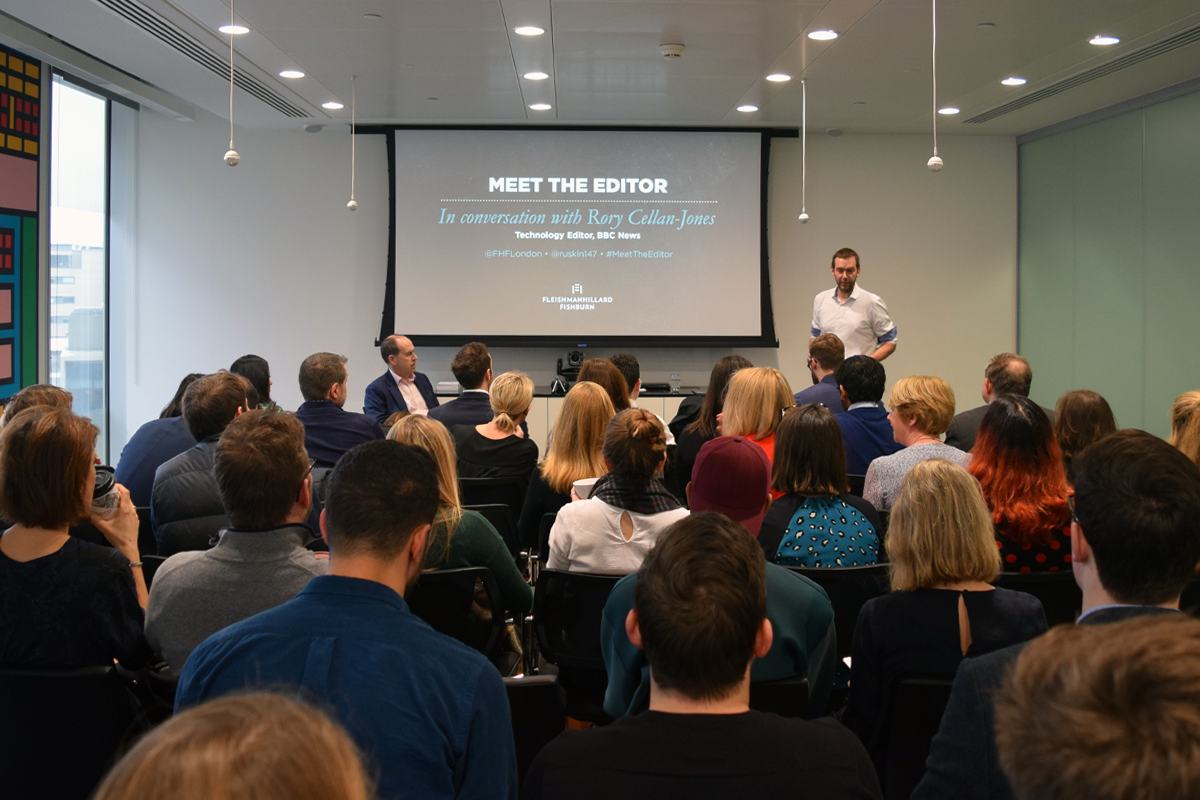Five lessons we learnt from Rory Cellan-Jones

Back at the turn of the century, Rory Cellan-Jones was crowned as the BBC’s first ‘Internet Correspondent’. His wife, a respected economist, remarked on hearing of his new title that it was a ‘sell signal’. The comment proved prescient when the internet bubble burst shortly after, and Rory returned to his wider role as a business correspondent.
It was seven years later in San Francisco, at something called the ‘Mac World’ conference – which he’d had to convince his editor to allow a day off from covering CES in Las Vegas to attend – that he saw Steve Jobs unveil the iPhone, arguably one of the seminal products of the new century. It was his first year in his new role as the BBC’s Technology Correspondent, and this time around, the title stuck.
Just back from the Mobile World Congress in Barcelona, Rory sat down with Pete Meikle, our Head of News at FleishmanHillard Fishburn, to discuss some of the major trends he’s seen in his decade as the BBC’s Technology Correspondent, from that original unveiling back in 2007 in San Francisco, to Nokia’s announcement at the MWC last week that they’re reviving the classic 3310 model.
It was a fascinating and wide-ranging discussion about artificial intelligence, the big tech companies, cyber-security, smart homes, wearables and that Tom Hanks film Sully. We’ve kept it a little tighter than all that, and pulled out five points from our conversation that’ll help you to tell a tech story effectively:
Sometimes your product really is going to change the world – but it probably won’t, so don’t over-egg things
When Rory covered the iPhone back in 2007, he received a lot of criticism that he was simply promoting a product (he’s written about it here). He argued that some products merit coverage when “they promise a step change in the way we live” and made the comparison with the Model T Ford. It was a stance he worried about to begin with, but developments in the last ten years appear to have vindicated his stance.
But it’s not a position to take lightly, and tech-boosters should be careful of over-egging new products. Rory gave the example of 3D Television, which never grabbed the public’s attention in the way the industry claimed it would.
Don’t ignore the implications of the ‘messy middle’, when the amazing technology meets the emotional human
Part of the reason 3D Television didn’t take off is that the user interface wasn’t taken seriously enough – it turned out that people didn’t like the process of having to put on a big set of glasses before they could engage with the technology. This is something that needs to be addressed in communications – consumers won’t be convinced simply because the technology is amazing, sometimes there’s more work to be done.
Driverless technology has similar issues to address. While it’s now incredibly advanced technically, consumers and policy-makers are yet to be convinced about the legal implications and feeling of releasing control to a computer.
Most people don’t care about the technological marvel anymore – more than ever, you need to show, not tell
Unfairly or not, we’re all a little jaded after a decade of technological advancements. The super-computer in our pocket is just a part of normal life now. Tech-types are more able to quickly understand the import of technical innovation, but they can’t afford to assume that customers are as interested as they are – it’s important to illustrate how a product will change the way we do things.
If you work in an industry that’s not directly of interest to the public, another approach is to develop one of your team as an expert commentator, able to step in and explain why something technical is actually very interesting.
Complicated topics are always in danger of clichéd coverage, so make sure you’re telling the story you want
You’ve probably seen some of the coverage Nokia generated when they announced that the classic 3310 model was returning to service. Retro-tech lovers were excited, and articles came out praising it as the ideal festival phone. But far fewer readers probably remember the real point of the announcement for Nokia, that they are producing a new range of affordable quality android phones.
This is the danger of clichés in tech – in a complicated industry, we all think we know the big narratives. Nokia tapped into the ‘retro-tech’ theme, and it was so effective it overwhelmed anything else they wanted to discuss.
What you already know or probably suspect – relationships are still the key to cutting through the noise
If you want to grasp the hand of an editor drowning in speculative emails, there are two rules to stick by. Build a relationship by being a reliable source who can take no for an answer, and bring something new to the table, whether it’s a piece of data that’s not otherwise available, or an eloquent spokesperson who’s concise and convincing on the complex topics.
And finally, on International Women’s Day, a note on pitching guests – Rory and the BBC are always looking for female experts to speak about tech topics. Lack of gender diversity is an issue for the wider tech industry, and it’s an issue for producers and journalists who are tired of all-male panels.
Cody Want, Senior Account Executive, Corporate
Find Out More
-
Achieving Outsized Impact by Building Stronger Country Reputation
February 18, 2025


